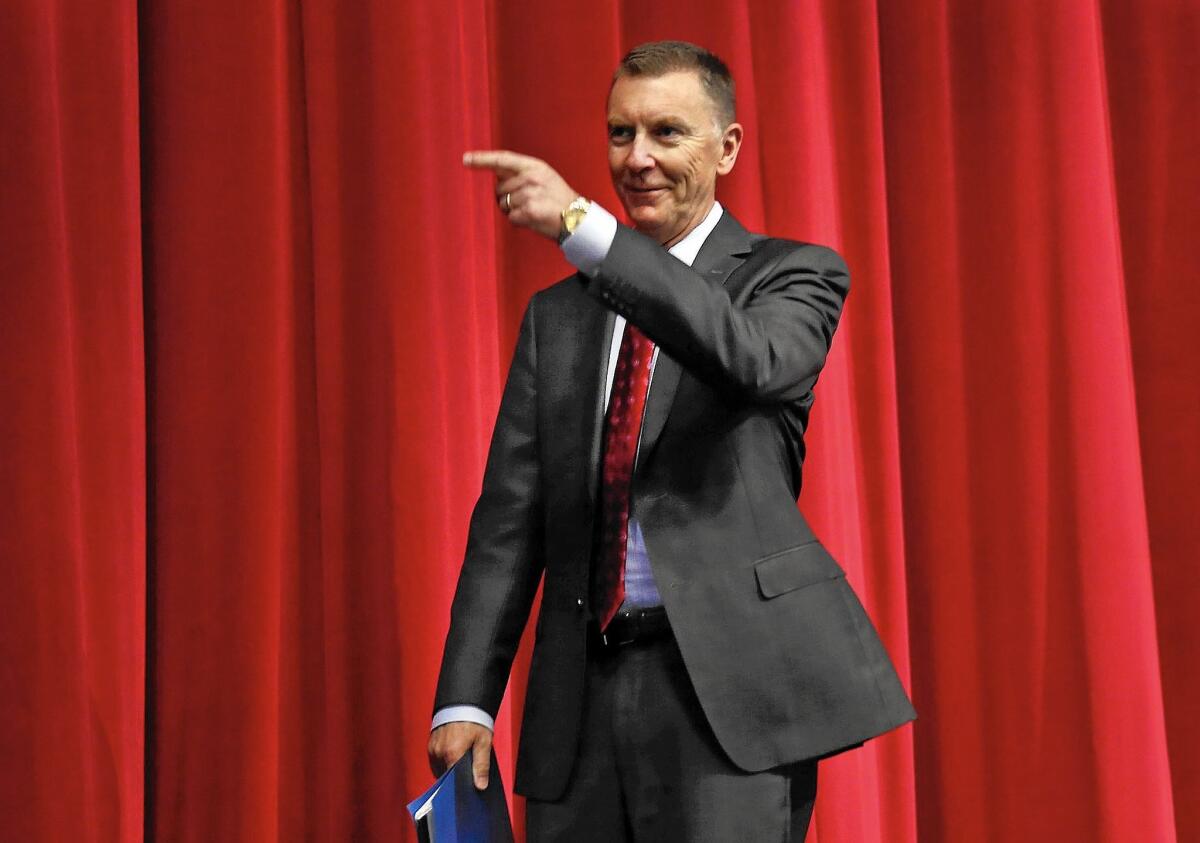Deasy’s exit leaves unfinished work at LAUSD

Los Angeles school officials knew what they were getting when they hired John Deasy in 2010.
He’d led national efforts to hold teachers accountable for student performance. He was brash, impatient and high-minded. He had the ear of billionaire Bill Gates, the backing of U.S. Secretary of Education Arne Duncan, and access to local philanthropists looking for projects to fund.
Deasy promised that in five years, he’d make Los Angeles a showcase for school reform. But he didn’t stick it out that long. Because the world around him shifted and he could not — or would not — adapt:
The city’s hard-charging “education mayor,” Antonio Villaraigosa, has been replaced by a hands-off mayor content with incremental gains. The school board is no longer dominated by big-picture reformers. The teachers’ union has a tough new leader and an uncompromising agenda.
The changes left Deasy marooned, with few allies and no insulation from his own personality flaws: He pushed too hard, bristled at criticism, didn’t know how to build consensus. He plowed ahead because he thought he knew better than everyone else.
That stands, for now, as the epitaph for Deasy’s too-short tenure.
But it doesn’t reflect the risks he took and challenges he faced.
It’s clear the district is better now than it was four years ago. And in pockets of Los Angeles, Deasy — for all his missteps — is a hero and a martyr.
::
Deasy had considered resigning last year, and the school board seemed ready to accede. Then hundreds of parents, community activists, civic leaders and civil rights advocates weighed in.
“He’s been a real warrior on behalf of vulnerable, marginalized kids,” said Robert Ross, president of the California Endowment, the state’s largest healthcare foundation.
He recalled meeting with Deasy to express concern about disproportionate punishment doled out to black and Latino boys. “I was expecting to be stonewalled,” Ross said. “I thought it would be a fight. Instead he was finishing my sentences. We were on the same page.”
Deasy is credited with raising the profile of social issues that interfere with learning. He arranged for children to have breakfast in their classrooms, ended reliance on student suspensions as a disciplinary tool, and directed more money to schools with the neediest pupils.
For decades, L.A. Unified leaders had focused on wooing and keeping middle-class students in district schools. Deasy made clear that underprivileged children were his priority. His goal was not just raising test scores, but “lifting youth out of poverty.”
He said that so often, the phrase became Deasy’s trademark among supporters — and a way to mock him among those who thought we ought to focus less on feeding hungry kids and more on teaching English.
“John Deasy told the unvarnished truth about the fact that these children were being shortchanged,” said Mark Rosenbaum of Public Counsel, which sued to force the state to intervene in problem-plagued local schools.
“He brought it to the attention of the school board, the court, the public.... I’d get emails from him at all hours of the day and night. He never stopped working for these kids. I think this is a huge loss, and the children of Los Angeles are the biggest losers.”
Even teachers union President Alex Caputo-Pearl gives Deasy credit for pushing issues like student discipline onto the public stage. “He jumped on the crest of waves that had been building around issues for years. He brought a sense of urgency; he weighed in, and things became policies.”
But some of Deasy’s policies amounted to little more than grandstanding, Caputo-Pearl said.
“He’d get some national headline: We’re doing away with suspensions. We’re going to be the first big urban district with a computerized student data system. But there was no preparation, no professional development …no plan for when things went sideways.”
Deasy got the credit, and overburdened schools were saddled with the mess.
::
It will take a while to settle on Deasy’s legacy. District test scores have soared and graduation rates are finally rising.
But Caputo-Pearl doesn’t buy the “things are better now” version of Deasy’s tenure. Morale is lower at schools than it’s been in decades, he said. Administrators are furious, teachers frustrated and parents bewildered by changes imposed with little training and no input from the trenches.
That’s why interim Supt. Ramon Cortines plans to make mending fences his priority. Everyone could use a break from Deasy’s passion and the school board’s drama.
No one is saying yet where the district plans to look for Deasy’s successor. Some of his deputies are educators he brought into the system after he was hired; others he plucked from campuses and catapulted into top spots.
Deasy’s been such a commanding presence, it’s hard to imagine that his underlings are ready for the spotlight.
In fact, it’s hard for me to imagine why anyone would want the job at all. The politics are toxic, the problems intractable, the pressure hard to bear.
In Cortines, we will have a peacemaker running things. But I hope there’s another troublemaker, like Deasy, waiting in the wings.
Twitter: @SandyBanksLAT
More to Read
Sign up for Essential California
The most important California stories and recommendations in your inbox every morning.
You may occasionally receive promotional content from the Los Angeles Times.











